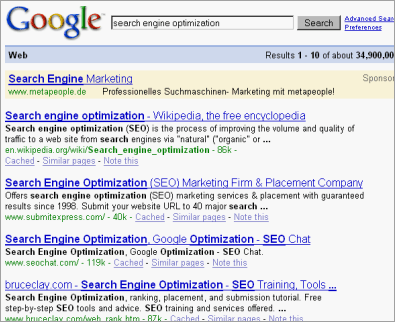Monday, November 12, 2007
The US Search Engine Optimization Market
Aaron Wall is an SEO (search engine optimization) consultant at Clientside SEM and the author of SEO Book, a blog with attached ebook. Aaron is 28 years old, living in Oakland, California. In this overview, he takes a look at the SEO market in the US.

Industry Consolidation
In the past few years Media Whiz bought Text Link Ads, NetIQ purchased Web Position Gold, and aQuantive purchased GoToast. DoubleClick owns a search engine marketing firm that goes by the name Performics. This year Microsoft purchased aQuantive and Google bought DoubleClick. The search engine marketing industry is consolidating, and some companies are purchased by the search engines directly. In other cases, many of the tools related to the field of SEO/SEM are being rendered useless by
- search engines providing free competing tools (like Google Analytics)
- search engines obfuscating marketplaces (ad quality scores and blind bidding makes bid gap software virtually useless, and toolbar PageRank scores are fairly meaningless given that some may be hand edited and PageRank is only updated once ever 3 months or so)
- search engines adding features to webmaster profiles (like ranking stats in Google Webmaster Central)
- relevancy algorithm improvements that make it cheaper to rank by being a legitimate authority instead of trying to fool the search engines
Why Ad Agencies do Not Get SEO
There are some big SEO firms, like Marketleap, Global Strategies International, Outrider, and iProspect, that have been purchased by ad agencies or other media conglomerates, but many of the ad agencies still do not get search. There is a fear that if everything is tracked and tested that many of the ad agencies might lose some of their relevancy, especially since many ad agencies are given a percent of ad spend, and get discounts for buying large volume ad buys for their customers. They have little interest in precise testing that might increase ROI while lowering ad budgets.
Comparing International Google Search Results to US Search Results
“I found that outside of the US the domain’s global link authority score (as estimated by PageRank) was not as important as it is in the United States.”
I recently met a couple friends in Vancouver and a month later got married to the most wonderful woman in the world in the Philippines (we met a while after she purchased my ebook, so without blogging I would be a lonely guy). While outside the US, one of my favorite hobbies was searching on Google to see how the search results differ from those inside the US. I found that outside of the US the domain’s global link authority score (as estimated by PageRank) was not as important as it is in the United States. Instead, smaller sites that were able to rank in the top 20 or 30 in the US tended to rank better in some of the foreign markets, while the high link authority sites saw some of their rankings lower in foreign markets. It also seemed that exact matching domains (like seobook.com for a search for seo book) got a bit more of a relevancy boost in foreign markets, especially if the domain ended in a local extension or was hosted locally.
SEO Does Not Scale
WebSourced/Keyword Rankings was one of the biggest SEO firms (perhaps the single largest SEO firm), but they closed shop in January of 2007. My mentor, who goes by the nickname NFFC, has maintained that SEO services do not scale. I tend to agree, and believe that the only scalable SEO business models are those that end up selling product as though they are a service, while minimizing actual client service needs. My SEO Book is probably a good example of that (though it has much room for improvement), so are the subscription based keyword research tools, text link ad sales businesses, other ad networks, and the wide array of conferences and membership sites popping up.
The Growth of In House SEO
As search gets more sophisticated, providing bulk low value SEO services to a wide array of customers gets harder, largely because search is becoming more about reflecting online and offline social relationships. Given that, many of the large corporations that believe in SEO have in house SEO teams. Even a search engine has offered me a job as an in house SEO working to train their team and optimize their portal. But they offered me less than I make working for myself, so no reason to get excited, put on a suit, and move.
Some of the larger search advertisers and trusted market leaders have special arrangements with search engines that help them better understand SEO and how to optimize their websites. These relationships are rarely (if ever) talked about publicly because it does not benefit either party to speak of them.
Who Are the World’s Best SEOs?

Google’s top results for the query “search engine optimization.”
As far as knowledge of the technical aspects of SEO go, few people can match Greg Boser or David Naylor. But most of the people who are anywhere near that level are quiet about their success. Many of the best SEOs work independently instead of inside of large firms, and some of the big players in the SEO field bolted a traditional business around that core skill and use it to propel their businesses. Many are affiliate marketers and website publishers that you have never heard of, making as much in a day as most people do in a year. Unfortunately I am not one of them, at least yet. ;)
Some brand guys and advertising guys have also stumbled into SEO. Scott Smith, my partner at Clientside SEM, worked at an ad agency for 20 years before getting into search marketing. As search continues to gain authority and relevancy improves, SEO will intertwine with branding, public relations, and social relationships. SEO will soon be viewed as a subset of the field of marketing rather than something you bolt onto your website.
The Best Conferences
Currently the best conferences in the field of SEO are Brett Tabke’s WebmasterWorld Pubcon and Danny Sullivan’s Search Marketing Expo. Incisive Media’s Search Engine Strategies had the lead for many years, but with the loss of Danny Sullivan they have lost a big chunk of their momentum and relevancy.
A few smaller conferences like SEO Class, SEO Days, and Elite Retreat have popped up, but due to the economics of holding conferences it is hard to make these types of operations profitable enough to pursue unless you get scale or are only using the conferences as a lead generation mechanism.
Common Fights in the Field of SEO
As far as SEO goes, there are probably some rivalries I am not fully aware of, but most of them that are highly public are driven by a need for attention in a competitive marketplace instead of SEO businesses trying to beat each other on a one to one basis. A few of the more common issues that arise time and again are:
- PPC (pay-per-click) firms that try to make SEO firms sound irrelevant
- SEO firms that try to make PPC firms sound irrelevant
- Self proclaimed white hat SEOs that try to make it sound like everyone in the SEO field (except them) is an unethical black hat spammer
- Search engines trying to steal large SEM clients from SEM firms (it happens quite often)
- Search engines that try to equate SEO with spam
- The two tiers of relevancy in hand editing
- Web personalities viewing SEOs as scum
PPC Firms vs SEO Firms
People who are good at SEO or PPC typically use some mix of both. PPC ads can be used to raise mindshare and awareness, test keyword value, and send traffic to linkworthy content as a link building technique. Building an organic SEO presence provides a cheap stream of fairly stable traffic, especially if you have a diverse set of inbound links and a large catalog of hand crafted unique content. Developing a strong SEO campaign likely helps boost ad quality scores due to improving site exposure, brand awareness, brand related searches, and user trust in the site. Doing both PPC and SEO gives marketers more flexibility with their business.
If demand exceeds supply, PPC ads can be stopped or bids lowered to reduce market exposure. If PPC prices temporarily get too high the marketer can turn them off or lower them and rely more on organic traffic. If organic rankings drop or PPC prices get low and margins widen then the PPC marketing budget can be increased until supply is a limiting factor.
White Hat SEO
“When I started out in the SEO field I was a spammer out of necessity ... Many of the best SEOs are technique agnostic and are willing to do whatever it takes to rank well within the desired risk tolerance.”
When I started out in the SEO field I was a spammer out of necessity. I would not have been asked to write this article if I didn’t get well known, and I never would have got well known without doing a bit of push marketing while I was learning. But as brands get established, it is easy to use fear as a marketing angle and claim how clean oneself is as compared to the competition. The truth is all SEOs at one point in time were ignorant to the field. As we learn and gain experience we shift from high risk work to lower risk techniques.
Many of the best SEOs are technique agnostic and are willing to do whatever it takes to rank well within the desired risk tolerance. When you are working for a large corporation with a large ad budget they have brand awareness and link equity which makes it easier to rank that type of site than it is to rank a thin affiliate site, which might require more aggressive techniques.SEO = Spam
If you read Google’s official page about SEOs, you will see they paint the field with some ugly remarks, such as
If you feel that you were deceived by an SEO in some way, you may want to report it.
The Federal Trade Commission (FTC) handles complaints about deceptive or unfair business practices.
and
For your own safety, you should insist on a full and unconditional money-back guarantee.
Yet if I were to tell you that you should expect a full and unconditional money-back guarantee if your AdWords ad spend did not produce profits, Google would tell you that I am a nutcase. Largely they have tried dismissing the field of SEO as being a subset of spam, but as bloggers have talked about SEO more it has become more mainstream. Given that, Google is working harder to dominate discussion in the field, and obfuscate some of the more common signs of trust (slow PageRank updates, removing the supplemental results label, etc.). It is no accident that Google did no PageRank update for about 6 months, then did one right around the same time that they edited the PageRank scores for a bunch of sites that were selling links. FUD is a core component to enforcing relevancy.
Two Tiers of Hand Editing
“In person and via email Matt Cutts is a very likable guy, but his job requires him to be blindingly hypocritical at times.”
In person and via email Matt Cutts is a very likable guy, but his job requires him to be blindingly hypocritical at times. Google pushes the concept of fairness, but as soon as they place the financial viability of websites in the hands and judgement of a single individual that fairness is thrown in the trash can.
[Update: On a related note, as editor, in retrospect I wish I had handled this post a bit differently. I welcome Aaron’s views again as I think he has some great insight into the US SEO scene, but as editor I think my job would’ve been to ask for a remodeling of one or two sentences which I now think are too personal (instead of highlighting such sentences). Guess I’m still learning what goes into editing guest posts, as I hope to get more, different blogging voices to Google Blogoscoped. -Philipp]
Some large corporations are buying out their competition to own virtually the entire first page of search results, others use a large number of subdomains, and yet both go unscathed by the hands of search engineers. Even when a large corporation gets busted, they rank again in a matter of days.
As a comparison, a few years ago I bought an old site that had about 500 inbound links. Over the course of a year and a half I spent about $50,000 on marketing and content development. I built over 12,000 organic inbound links into the site, so my link profile was at least 95% organic, clean, and hand built using editorial votes.
After building up the site’s profile I decided it made sense to rebrand the site using a stronger domain name. I 301 redirected the site to a new domain (same design, same content, same topic) and then blogged about how to rebrand a site. Shortly after writing that blog post a Google engineer read my blog and killed ALL of my link equity. Next thing I know an AdSense spam site that stole all my content was ranking where my site should have been. In spite of having email contact with Google search engineers, and explaining that I built most of the links organically, they did not care a bit. I am an SEO so I am scum, and that site should die because it is mine.
The site in question was of high enough quality that organizations like the US Coast Guard and the US Embassy gave the site free unrequested organic links. Content quality was not the issue. My association with the site is what killed it. How do you compete in competitive markets where the competition buys links that you can’t buy, gets first mover advantage when they clone your marketing ideas, and another set of competitors steals your content, all the while Google is hand editing out your organic links? You can’t, unless you obfuscate your identity.

Google’s head of webspam team Matt Cutts (left) with Aaron at a 2006 conference.
To be fair to the Google team, they are only human, and if I had to look at spam all day long I would probably get angry and make a few bad calls too.
That event was unfortunate, but it taught me a lot about why it is stupid to trust Google, and why no SEO should ever allow themselves to do it.
Web Personalities Calling SEO Scum
Someone who recently launched a human rolled search product used “SEOs are scum” as their public relations angle to promote their business model. SEO is easy to pick on because Google is so influential and has worked so hard to associate SEO with spam, and virtually everyone has had to deal with coming across irrelevant search results or email spam.
The solution for ignorance is education, but many of the people who paint SEO in a negative light do so intentionally with poor intent. As more people talk about SEO and more people discover the value of search those “SEOs are scum” opinions will likely get drowned out by rational voices who have some grasp on reality, and webmasters realizing who is using misinformation at the core of their marketing campaign.
There are four major global search companies – Google, Yahoo, MSN, and Ask. I have been offered a job as an SEO manager at one search engine. I was told my book is required reading by the leader of the relevancy team at another search engine (which still amazes me considering how new I am to search and how complex the field is). I am friends with the SEO manager working at another major search engine. And even Google was caught cloaking. If they all do SEO, then it doesn’t make sense that they tell you doing the same is somehow unethical.
Recent SEO Events
Some of the biggest search marketing stories from the last year are
- Google’s purchase of YouTube, and rolling out universal search that integrates different search verticals in the organic search results
- Google’s willingness to hand edit sites, hand edit PageRank scores, and move toward scaring people away from buying or selling links
- Google AdWords Quality Score changes that have made it prohibitively expensive to market some business models or websites
- Google removing the supplemental results label from their search results
Most of the SEO discussion is dominated by Google because they have the largest traffic stream. It will likely stay that way for years to come unless they do something that causes a backlash from webmasters, a lessening of user trust, or government regulation of some type.
[Source of first image Creative Commons-licensed by Brian Caldwell.]
Update: Matt Cutts replies to one of the claims in the post.
>> More posts
Advertisement
This site unofficially covers Google™ and more with some rights reserved. Join our forum!
